Life BaĦAR for N2K Conference Presentations – Day 3
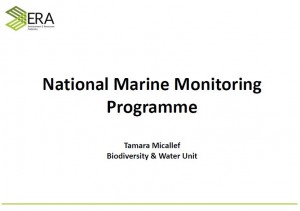 National Marine Monitoring program – Ms Tamara Micallef
National Marine Monitoring program – Ms Tamara Micallef
Tamara Micallef is an Environment Protection Officer and works with the Biodiversity and Water Unit within ERA, with respect to the implementation of the EU water policy, including the implementation of the EU Marine Strategy Framework Directive, Water Framework Directive and related policies.
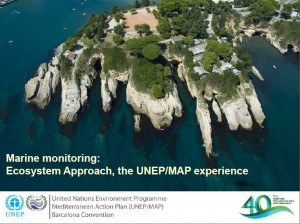 Marine Monitoring – ecosystems approach – Dr Daniel Cebrian
Marine Monitoring – ecosystems approach – Dr Daniel Cebrian
Dr. Daniel Cebrian has been contributing for three decades on fields related to conservation research as well as biological diversity preservation policies and governance in the Mediterranean region, mostly in marine and coastal ecosystems but also in terrestrial ones. He holds a PhD in Zoology and Anthropology applied to biological conservation. He is presently the Strategic Actions Programme (SAP BIO) Coordinator of the Protocol for Specially Protected Areas & Biological Diversity (SPA/BD) of the Barcelona Convention, within the Regional Activity Centre for Specially Protected Areas (SPA/RAC), a UNEP Mediterranean Action Plan (UNEP/MAP) implementing agency. Among recent activities, he developed and launched a strategy and a linked project (2009- ongoing) to boost the Mediterranean countries capacity to create national networks of MPAs and contribute to a Mediterranean regional one.
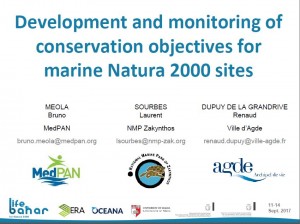 Development and Monitoring of Conservation Objectives for marine Natura 2000 sites – Mr Bruno Meola
Development and Monitoring of Conservation Objectives for marine Natura 2000 sites – Mr Bruno Meola
Bruno Meola is the data management officer of MedPAN, the network of managers of MPAs in the Mediterranean Sea. His mission consists of improving knowledge on Mediterranean MPAs by developing, maintaining and updating the MAPAMED database, which gathers information on MPAs and other sites of conservation interest in the Mediterranean Sea. This information is made freely available and may then be used by NGOs, scientists, managers, institutions or even the general public. Bruno also works on the development of monitoring tools to support Mediterranean MPA managers in their activity.
Malta-E.Ballesteros 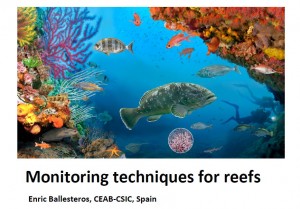 Monitoring techniques for reefs – Dr Enric Ballesteros
Monitoring techniques for reefs – Dr Enric Ballesteros
Enric (Kike) Ballesteros (Barcelona, Spain, 1958), Doctor in Biological Sciences by the University of Barcelona, is a field naturalist whose interests are focused in marine and freshwater ecosystems, although he has also involved in the study of terrestrial environments. Based at the Centre d’Estudis Avançats de Blanes, CSIC, Spain, he has mainly studied the Mediterranean region although his passion for nature has brought him to travel around the world. He is a specialist on seaweed and seagrass taxonomy and ecology, although he has also a good knowledge on marine invertebrates. His main subjects of research include habitat mapping and description, the effects of introduced species on marine ecosystems, seaweed ecology, marine protected areas, herbivory as a driver of change in shallow water habitats, and the long-term monitoring of benthic communities. He has contributed to more than 300 research papers, books and book chapters and 70 chapters in public outreach books.
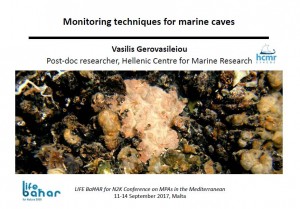 Monitoring techniques for caves – Dr Vasilis Gerovasileiou
Monitoring techniques for caves – Dr Vasilis Gerovasileiou
Dr Vasilis Gerovasileiou completed his BSc and MSc at the University of the Aegean and his PhD at the Aristotle University of Thessaloniki in Greece. Since 2014 he is employed as a post-doc researcher at the Hellenic Centre for Marine Research in Crete. He has been involved in more than 30 research projects, oceanographic studies and environmental impact assessments. He is the coordinator and member of the editorial board for the World Register of marine Cave Species, a thematic species database of the World Register of Marine Species (WoRMS). His research focuses on marine biodiversity and more specifically on the ecology of marine caves and hard substrate benthos. His scientific field includes research on scientific diving and sampling techniques. Furthermore, he has been involved in marine conservation, biodiversity informatics and citizen science initiatives.
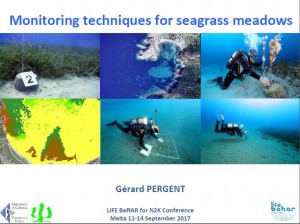 Monitoring techniques for seagrass meadows – Prof. Gerard Pergent
Monitoring techniques for seagrass meadows – Prof. Gerard Pergent
Gerard Pergent is a professor at the University of Corsica for over 15 years and Director of the “Coastal ecosystem “Team. Since 2012 he is also the head of the CHANGE program on Global Changes in insular environments). He has more than 30 years research experience on Posidonia oceanica and his current research efforts focus on the functioning of the Mediterranean coastal ecosystems based on the ‘Posidonia oceanica’ model and how sea grass meadows record global change and help mitigate their effects. His research output has been published in over 90 publications, with an H-index of 28 and more than 2000 citations.








